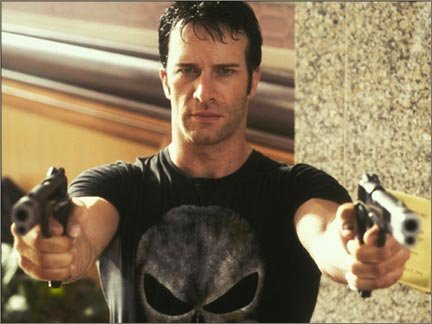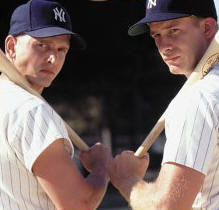Copyright ©2012
PopEntertainment.com. All rights reserved.
Posted:
September 16, 2012.
An actor with raw talent runs a comic book empire called Raw Studios.
Thomas Jane doesn’t shy away from controversial roles or from his
passion for comic books and graphic novels. His early days as a
struggling and often homeless actor have taken on the stuff of legend,
but today he’s a bankable name who makes producers nod with satisfaction
and recognition.
He’s appeared as Mickey Mantle in HBO’s 61*, a male prostitute in
Showtime’s Hung, and a part of the famous firecracker scene in
Boogie Nights. In addition, he annually sets Comic-Con ablaze with
his totally wicked series of comic books and graphic novels: Dark
Country, Bad Planet and Alien Worlds, among others.
His works are products of his personal production company, Raw Studios.
Busy man, but he takes a moment to give us his thoughts as to what keeps
that engine revving.
On being an actor:
There are certain actors who just want to say their lines and go home.
Then there are actors who think of themselves more as storytellers.
That’s how Harrison Ford once described himself. That always stuck with
me. I like the idea that I’m a storyteller. Whether you are telling a
ghost story around a campfire or in a $100 million movie, you’re telling
stories. And if you are doing that with a graphic novel or a script,
yeah, there are different rules, but essentially you are just telling
stories, man.
 On
Raw Studios:
On
Raw Studios:
I’ve always been a fan of science fiction and horror. It’s what I grew
up on. But the stuff that inspired me to be a storyteller didn’t exist.
Raw Studios fulfilled a need for the stuff that just wasn’t around.
That’s how Bad Planet was born and all the books that came after
that, like Pig Farm and Dark Country.
On attending Comic-Con:
It’s our sixth year and this year was our best year yet. We had so much
fun. We debuted our "Dirty Laundry" short to an unsuspecting crowd of
Punisher fans. That really made my show. We kept it totally under
wraps so nobody knew what we were unveiling. That was really the fun
part for me: being in a room with 300 fans and unveiling this thing for
them and just listening to the crowd respond. That surprise was so
visceral and very rewarding. It was super cool.
On the Baltimore native’s humble beginnings in Hollywood:
I came out here with no money and I didn’t tell anybody.
I didn’t have any family or connections. The first thing I did was walk
up to Hollywood Boulevard and look at the stars on the sidewalk. I had
no idea how to get into Hollywood or how to be an actor, but I did find
my way into an acting school. I sold my car and gave the money to the
acting school. This left me without any money for a place to live, so I
was homeless for a little bit. I stayed in welfare hotels downtown and
slept on some park benches.
On the famous firecracker scene in Boogie Nights:
It was Boogie Nights that got me noticed and got
me steady work. I was lucky enough to get somebody to give me the script
and that scene in particular was probably the best scene in the whole
film. The character of Todd Parker was available, so I specifically
asked to audition for Todd Parker just so I could be in that scene. The
reason that movie is so good is because [director] Paul [Thomas
Anderson] understands actors and lets them do their thing. Directors who
get that usually end up with a really interesting movie. That’s because,
believe it or not, when you are watching a movie, you are watching the
actors. You’re not watching the focus or the shot; you are
watching the actors. And that’s the difference.
 On
portraying Mickey Mantle in 61*:
On
portraying Mickey Mantle in 61*:
That was probably the most fun I had making a movie, just because I got
to play baseball and make a movie! I also got to hang out with [major
league outfielder and coach] Reggie Smith. I never played baseball
before, so as Reggie said, I didn’t have any bad habits. [Director]
Billy Crystal was a joy to work with. He knew every single game and
every single play that the Yankees played in 1961. It was a magical
experience. I am very grateful that I got to be a part of that.
On his starring role as a male prostitute in Hung:
I took the job because it’s so hard to find great
writing. I responded to the great writing. Writing is really hard. I
think it’s the hardest job in Hollywood, to do it well. And the fact
that the guy’s got a big dick is sort of the Trojan horse that gets you
dragged into the show. But I also think that the title drove a lot of
people away. There is something kind of braggadocio about it,
about calling the show Hung. But when you watch it, you realize that the
guy is sort of the opposite of a cocky guy with a big dick. He’s really
an insecure, middle-aged hometown hero gone to seed. And that’s what
makes it charming and fun. I had a blast and worked with a lot of great
people, especially Anne Heche, my love.
On keeping his eyes on the prize:
What I noticed about growing up and wanting to be an actor, if [an
aspiring actor] had another thing that they could do, like if they were
good with numbers or they could manage a restaurant, then nine times out
of ten, that backup plan is what would happen for them. I consciously
decided never to have a net. I never put a net out. No Plan B. I think
that did influence my life and I think that that did help. It did give
me an advantage over some other folks who did have a Plan B. I didn’t
have anything else to do. It was either do this or go hungry.
Check out Tom’s
site:
http://rawstudios.typepad.com/
Features Return to the features page